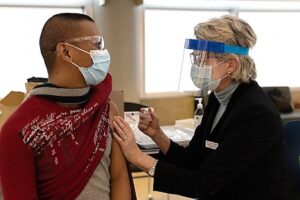Neoliberalism as an enabler of the spread of Covid19
Imad A. Moosa

The spread of Covid19 was aided by unpreparedness, the fact that the private sector cannot deal with a pandemic, neoliberal policy makers who could not care less about ordinary people, and years of dismantling public health systems through privatisation. Since the 1980s, belief in the power of the market has led to a status quo where governments take a back seat, allowing the private sector to steer the economy for the benefit of the oligarchy. As a result, governments have been put in a position where they are not always properly prepared and equipped to deal with crises such as Covid 19. Free markets cannot deal with a crisis of this magnitude. The economy is like the human body: a person who cuts himself shaving does not need the intervention of a surgeon, but the intervention of a surgeon is required when a person is involved in a major car accident.
Covid19 is not a “black swan”, but rather a case of neglected risk, where neglect can be attributed to neoliberal thinking, to the belief that that the market can solve any problem and that it does a better job than the public sector. It is true that a pandemic on this scale is a once in a hundred years event, but it has been a hundred years since the Spanish flu decimated humanity. The fact of the matter is that the Covid19 pandemic was not unexpected. Gilding (2020) suggests that this virus was “the first in a herd of stampeding black elephants racing towards us”. In November 2005, 15 scientists published a letter in Nature Medicine, in which they warned of the possibility that a SARStype bat coronavirus would appear in humans (Menachery et al., 2015). And in The Black Swan, Nassim Taleb warned of “the risk of an acute and very rare virus across the planet” (Taleb, 2010). The US National Intelligence Council (2004) also warned that globalisation could be slowed down or stopped by a pandemic. In April 2015, Bill Gates warned that “if anything kills over 10 million people in the next few decades, it is most likely to be a highly infectious virus rather than war” (Gates, 2015).
The production and accumulation of the goods necessary to manage a pandemic are hindered by the manufactured leadership role of the private sector, which is motivated by one thing only (profit). For example, the early stages of the pandemic witnessed a scramble for personal protective equipment (PPE) and ventilators because they were in short supply. Olsen and Zamora (2020) suggest that the chaos provoked by the dramatic shortages of basic medical equipment illustrates the wasteful competition associated with marketdriven solutions. SaadFilho (2020) argues that “the disintegration of the global economy left the wealthiest and most uncompromising neoliberal economies, the USA and the UK, exposed as being unable to produce enough face masks and personal protective equipment for their health staff, not to speak of ventilators to keep their hospitalized population alive”.
The spread of the virus was aided by “epidemiological neoliberalism” as Frey (2020) calls it. The underlying principle here is to let the market work its magic, even if it means allowing people to get sick and die from “just another flu”. Epidemiological neoliberalism is symbolised by herd immunity, which relies on the assumption that a contagious disease is best overcome by leaving it unregulated. After all, an unregulated market and an unregulated contagious disease are similar in that they both kill, primarily the weak, the poor, the homeless and people with low socioeconomic status. It is therefore plausible that Frey describes herd immunity as “biological warfare” and a “logical continuation of the political rationale that has governed the world for the past decades, taken to an extreme as a laissezfaire social Darwinism”.
Source:
Real World Econ Rev blogs, 14 Oct 2022 https://rwer.wordpress.com/2022/10/14/neoliberalismasanenablerofthespreadofcoronavirus/
The references appearing in the text are cited in the author’s larger paper: http://www.paecon.net/PAEReview/issue101/Moosa101.pdf
Imad Moosa is a retired professor of economics and finance. Among the many books he has written is the recent “The Economics of COVID19: Implications of the Pandemic for Economic Thought and Public Policy” (Edward Elgar, 2021).






























